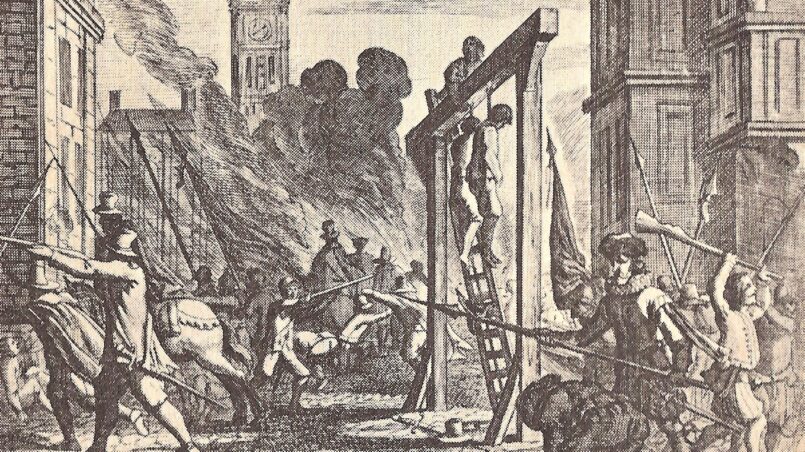About 22 years ago, I took a trip to France. While there, I visited the famed Louvre Museum in Paris, the home of Leonardo da Vinci’s Mona Lisa. I stood before this small but renowned painting housed in bulletproof glass gazing at its mystery, intrigue, innovation, and beauty. It’s not my favorite painting, but it’s remarkable, nonetheless. It’s remarkable because da Vinci was remarkable. Though we haven’t met him, we do know something about da Vinci by seeing his artwork. The Mona...
Category - Uncategorized

The Joy of Being Reformed (2): How Knowing the One True God Fills Your Heart with Happiness & Thankfulness
This past Sunday evening we had two families over. They stayed for hours late into the evening. It was wonderful. Our connection began years ago at Grove City College before any of us were married. We don’t get to see them often, so when we’re together it’s memorable and sweet. Sunday night was just that. My heart was filled with happiness and thankfulness as I enjoyed our friends. Even our children—all twelve of them—who don’t know each other well, really connected and had a...
Are you Reformed? Am I? How would we go about answering that question? And if you were looking for a church home, and you visited a church that claimed to be Reformed, what might you expect them to teach and practice? Before we could say, “I’m Reformed” or “I’m not Reformed” or “I go to a Reformed church,” we’d need to know what it means to be historically Reformed. We’d need an honest and historically accurate definition of Reformed, right? And this isn’t very easy to...
“Indeed, Christ drank all the poison of death in order that we might not taste the wrath of God in our death . . . . This should encourage us to be obedient to God in our deaths, since Christ yielded His will to that of the Father for us, and drank and removed the wrath of God for us like a bitter potion.” [1] “Thus our physical death is neither a payment for our sins nor an entrance into eternal death but a putting an end to our sinning and an entrance into eternal life.” [2] [1]...
One problem I have with credobaptism is that it doesn’t consider covenant children part of Christ’s church. Credobaptism assumes covenant children, particularly infants, do not possess the seed of faith and are not united to Christ, therefore, they are considered outside the church and part of the kingdom of Satan. Since the children cannot verbalize faith in Christ, credobaptism assumes they are outside of Christ. Is that an assumption Christian parents and churches should make considering...
“He, therefore, who boasts of having applied to himself by faith the death of Christ, and yet has no desire to live a holy and godly life, that he may so honor the Savior, lies, and gives conclusive evidence that the truth is not in him; for all those who are justified are willing and ready to do those things which are pleasing to God. The desire to obey God can never be separated from an application of the death of Christ, nor can the benefit of regeneration be experienced without that...
New boy in the neighborhood Lives downstairs and it’s understood. He’s there just to take good care of me, Like he’s one of the family. Do you know these lyrics? If you grew up in the 80s, you might recognize them. Here’s the chorus: Charles in Charge of our days and our nights Charles in Charge of our wrongs and our rights And I sing, I want, I want Charles in Charge of me. Charles in Charge debuted on CBS in 1984. I was four years old. The star...
“it should be maintained that the divine nature did not undergo any essential change in the incarnation. This also means that it remained impassible, that is, incapable of suffering and death, free from ignorance, and insusceptible to weakness and temptations. . . . The result of the incarnation was that the divine Saviour could be ignorant and weak, could be tempted, and could suffer and die, not in His divine nature, but derivatively, by virtue of His possession of a human nature.”...
“The human nature of Christ as such does not constitute a human person. The Logos did not adopt a human person, so that we have two persons in the Mediator, but simply assumed a human nature. . . . [his human nature] has no independent subsistence of its own. . . . the Logos assumed that nature into personal subsistence with Himself. . . .it should be maintained that the divine nature did not undergo any essential change in the incarnation. This also means that it remained impassible, that...
The Holy Spirit miraculously sanctified that which was conceived and produced in the womb of the Virgin, so that original sin did not attach itself to that which was thus formed; for it did not become the Word, the Son of God, to assume a nature polluted with sin, for the following reasons: 1. That he might be a pure sacrifice; for it was necessary for him to make satisfaction for sin. 2. That he might also, by his purity, sanctify others. 3. That we might know that whatever the Son says is...





